How to get help in Windows 11
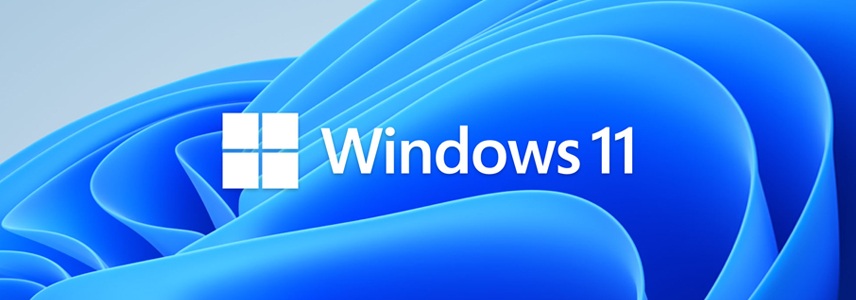
After getting used to the interface of previous versions of Windows, it may be challenging to adapt to Windows 11. But don't worry, Windows 11 provides a wealth of help resources to help you master various functions more easily.
This article will guide you on how to use the tools that come with Windows 11 to obtain support so that you can quickly find official solutions when you encounter problems.
Method 1: Use the “Getting Started” app
Windows 11’s “Getting Started” apps are great mentors for beginners. It helps users easily complete the basic settings of the system and introduces new features concisely. Follow its guidance and you will quickly become familiar with this new operating system.
1 Click the "Start" menu, find and click the "Getting Started" app, and select "Get Started".
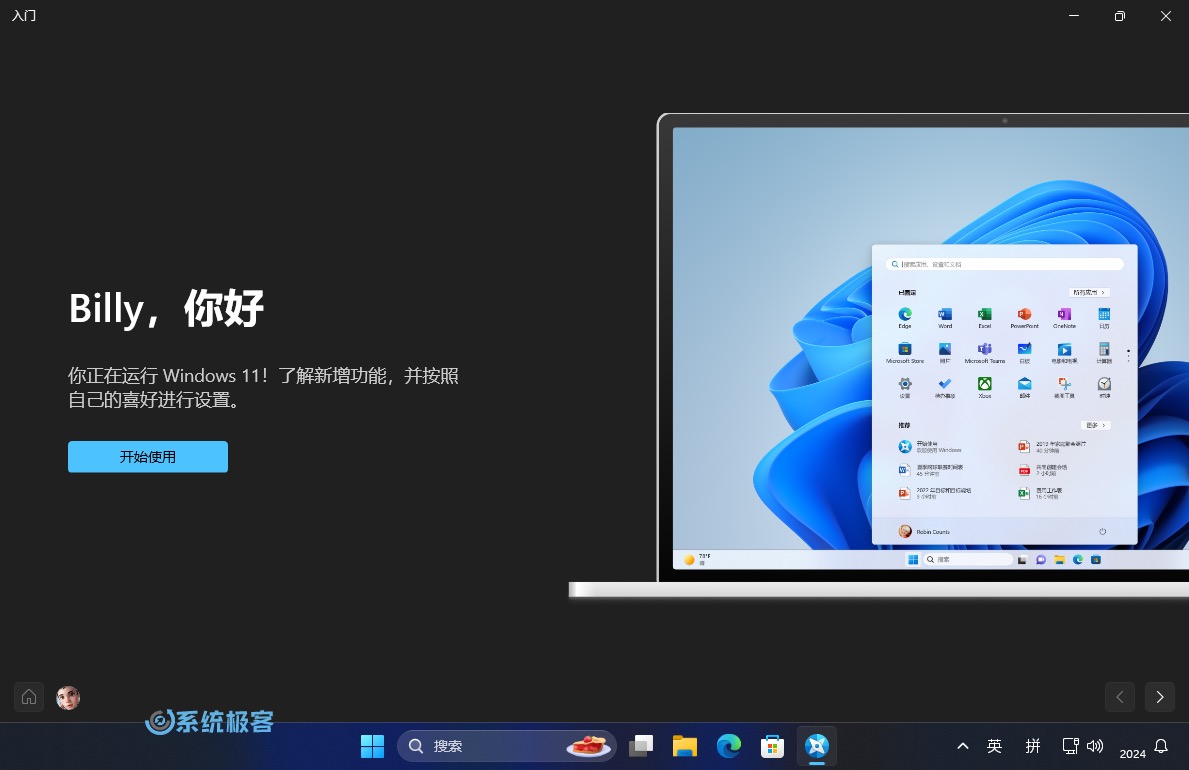 Click "Get Started"
Click "Get Started"
2 Based on your usage needs and interests, such as "Games", "Creativity" or "Entertainment", select the corresponding option and follow the prompts.
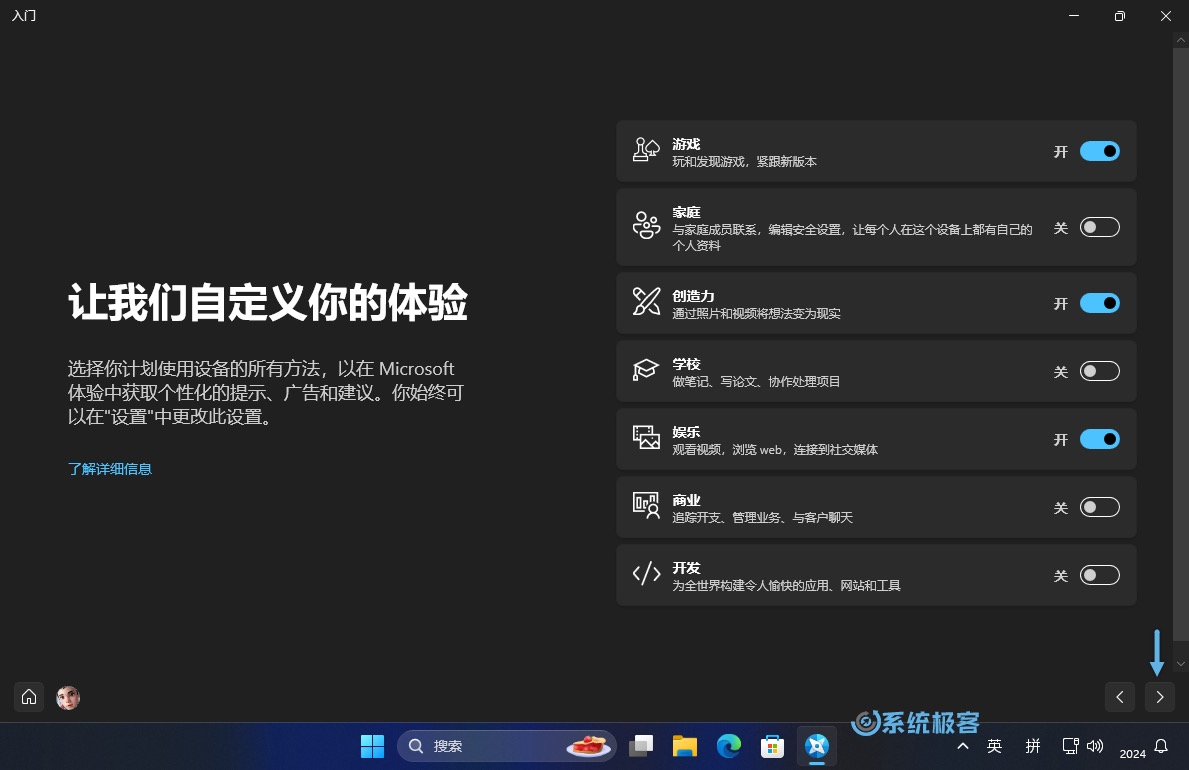 Select Windows 11 usage scenario
Select Windows 11 usage scenario
3 Follow the on-screen guidance to gradually understand and set up related functions of Windows 11.
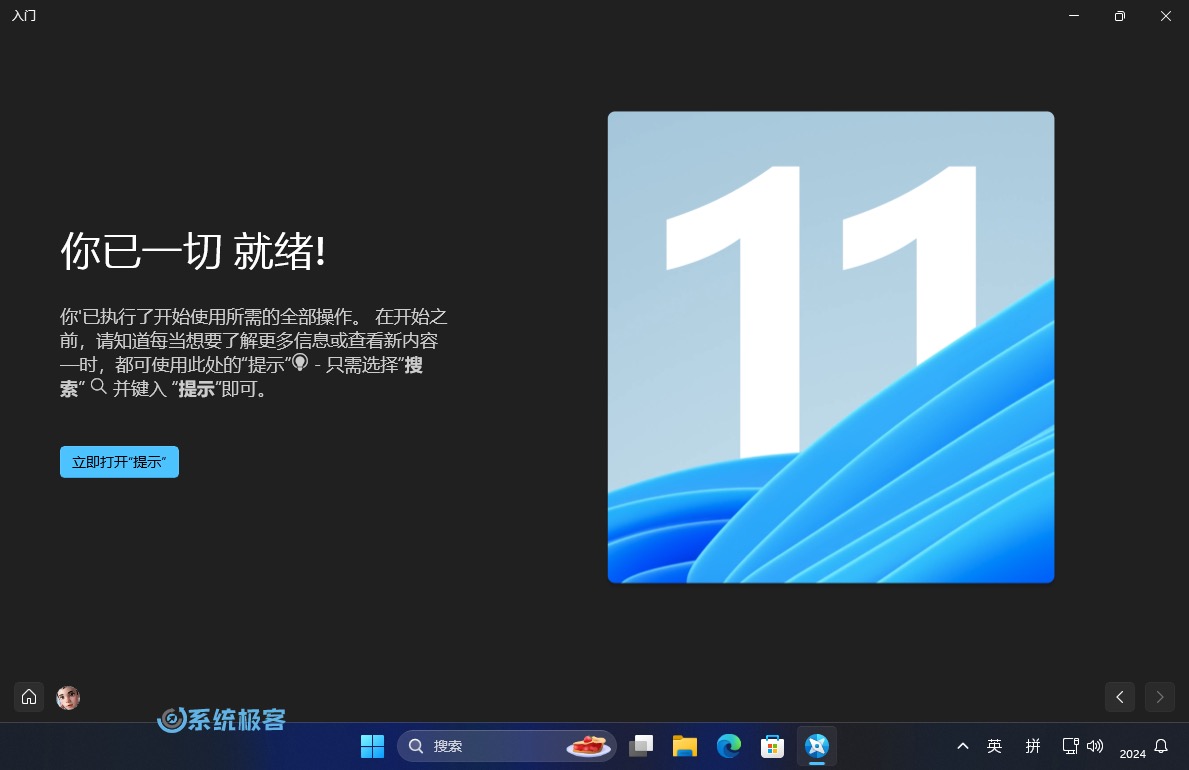 Windows 11 "Getting Started" App
Windows 11 "Getting Started" App
4 You can also open the "Tips" app immediately to get more learning materials.
Method 2: Use the Tips app
The “Tips” app is another useful tool provided by Windows 11. Whether it is desktop settings, personalization, shortcut key usage, or security enhancement, it can provide practical information in many aspects.
1Open the "Tips" app from the "Start" menu.
2Select the topic category you are interested in.
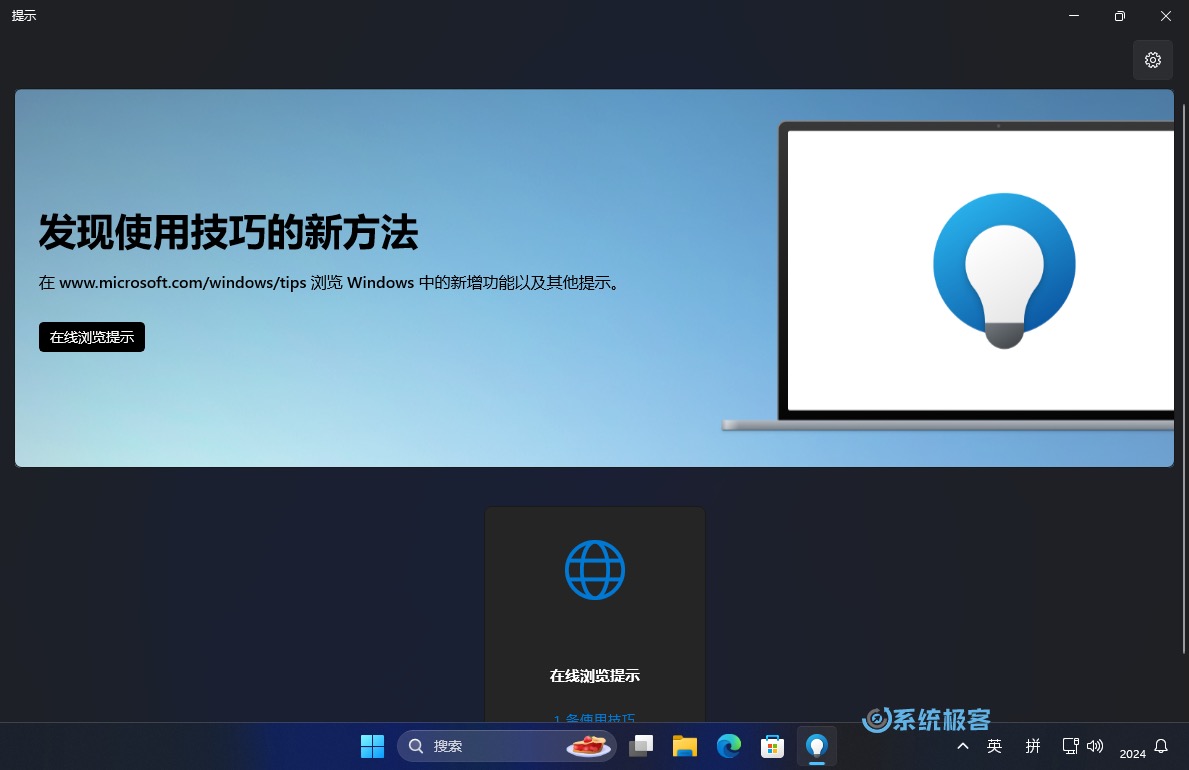 Windows 11 “Tips” App
Windows 11 “Tips” App
By practicing these tips, you'll be able to master Windows 11's new features faster.
Tips" application has been redirected to the Windows 11 features & tips page.
Method 3: Use "Get Help" to solve the problem
The “Get Help” app is a built-in question-answering tool in Windows 11. It provides answers to questions, official guidance links, and you can also contact Microsoft technical support.
1Open the “Get Help” app in the “Start” menu.
2 (Optional) Sign in to your Microsoft account to contact Microsoft support directly.
3Describe your problem in the dialog box and choose the most appropriate suggested option.
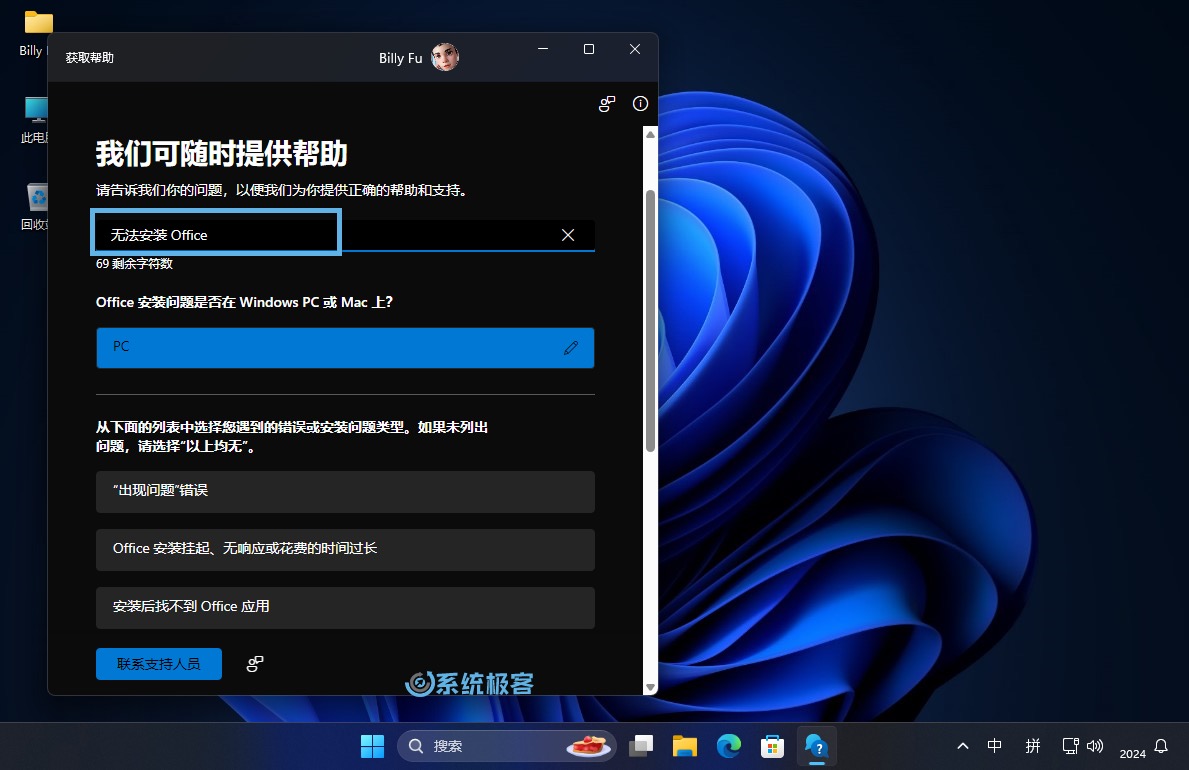 Search question
Search question
4 Read the troubleshooting guide or related answers carefully.
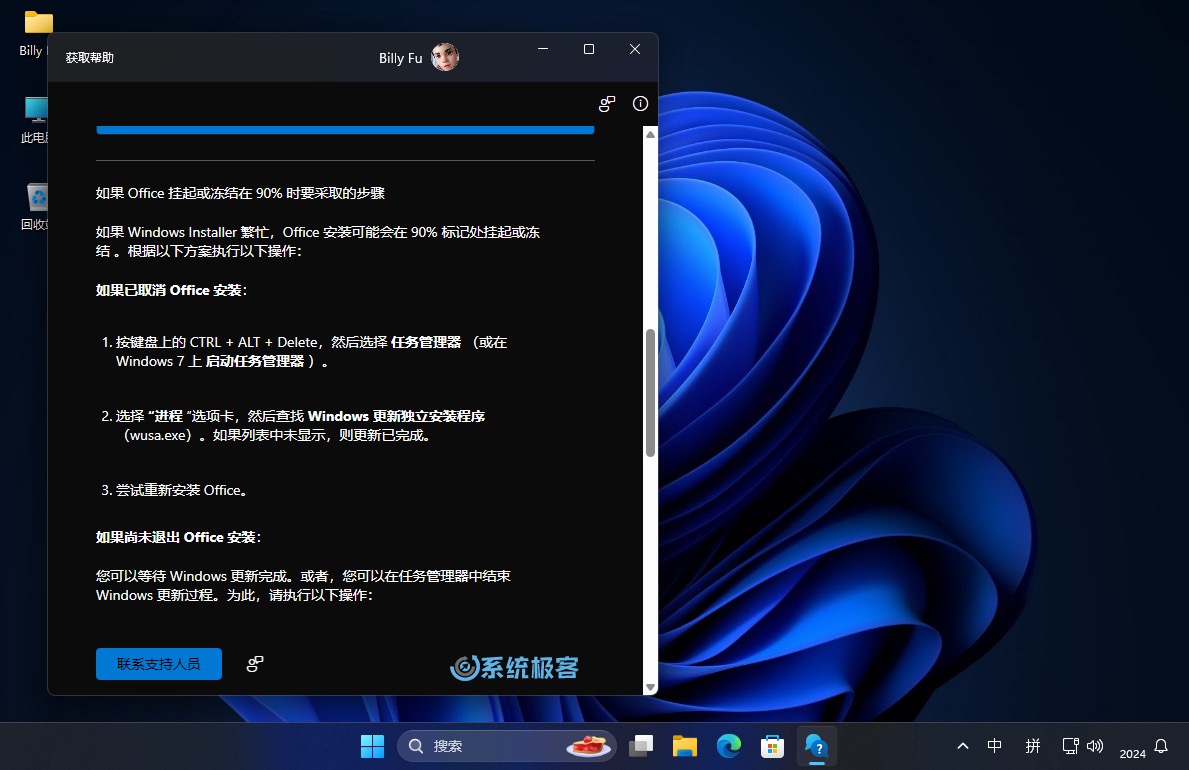 View answers to questions
View answers to questions
5 If the problem is not resolved, you can "Contact Support" for further assistance.
Method 4: Use "Quick Assistant" for remote assistance
"Quick Assistant" is a remote assistance tool pre-installed in Windows 11. It can help others or receive help remotely. It is a good alternative to remote desktop software such as TeamViewer and AnyDesk.
When helping:
1Open "Quick Assistant" from the "Start" menu.
2 Click "Help Someone".
3 Log in to your Microsoft account and send the generated security code to those who need help.
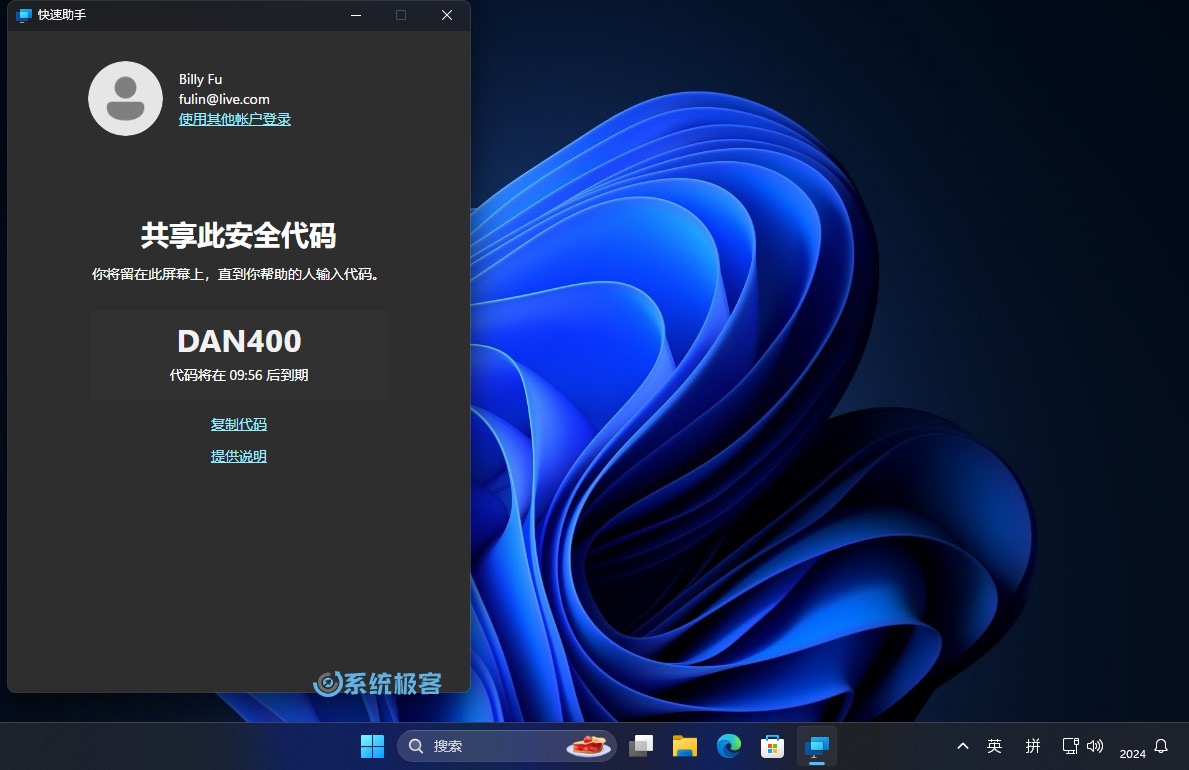 Quick Assistant: Remote helper generates security code
Quick Assistant: Remote helper generates security code
When you get help:
1Enter the security code before expiration.
2Click "Share Screen".
3 Click "Allow" to authorize the other party to view or control your screen.
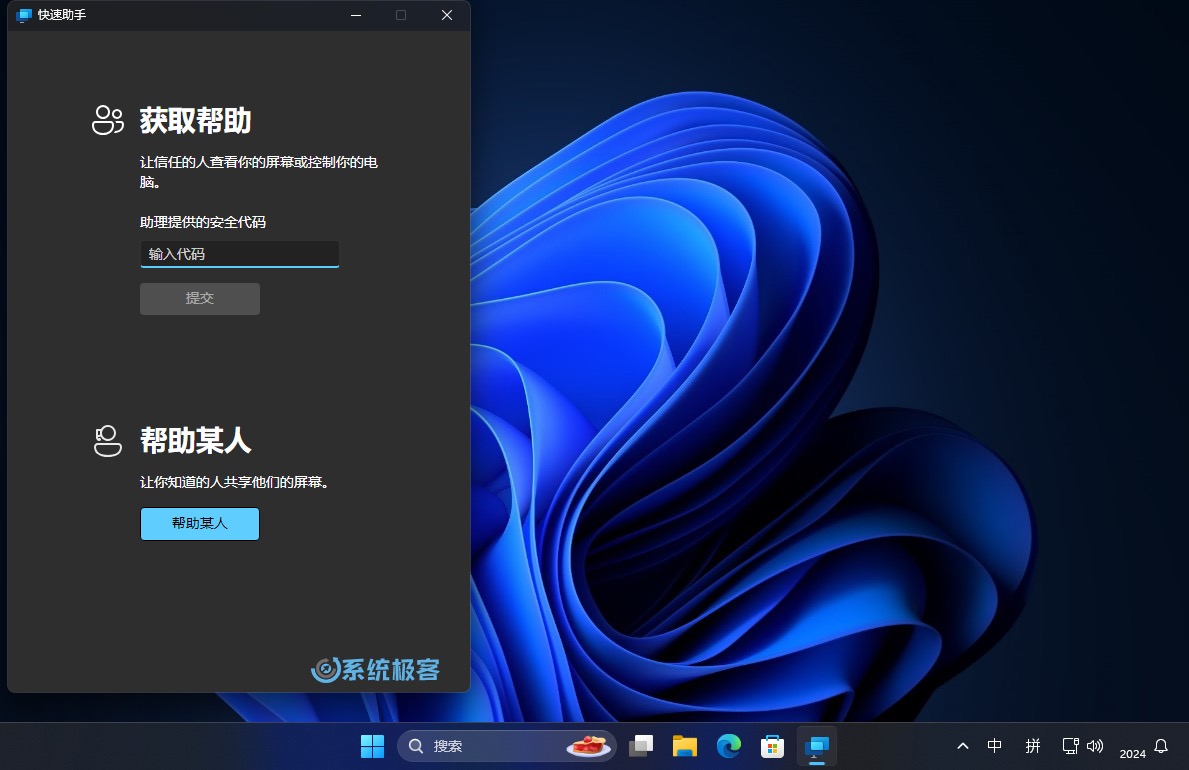 Quick Assistant: The recipient fills in the security code
Quick Assistant: The recipient fills in the security code
Recommended reading: How to use Windows Quick Assistant for remote assistance
Method 5: Use the Troubleshooter tool to troubleshoot the issue
Windows 11 has a series of built-in troubleshooting tools that can automatically detect and repair system problems, covering audio, network, Windows updates and other aspects.
1 Press the Windows I shortcut key to open "Settings" and click "System" > "Troubleshooting" > "Other Troubleshooting".
2Click "Run" the troubleshooting tool according to the type of problem encountered.
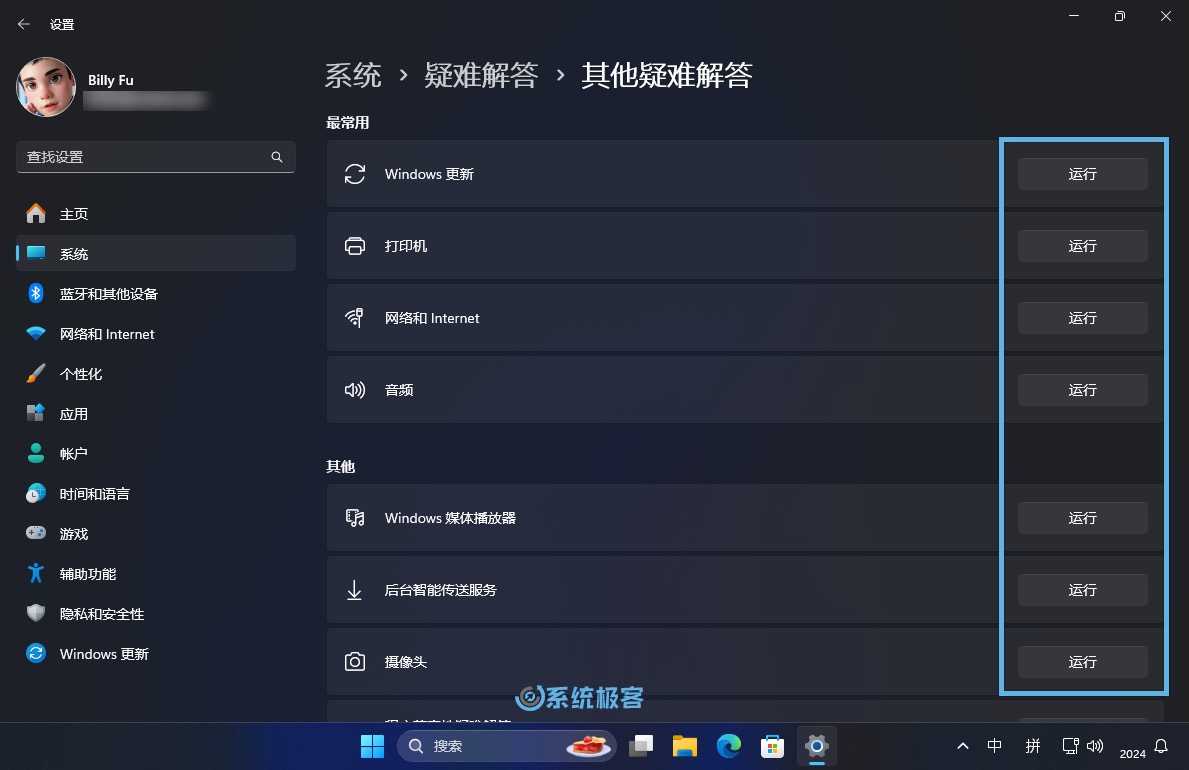 "Run" troubleshooting tool
"Run" troubleshooting tool
3 The troubleshooting tool automatically scans the system and provides solutions or automatic repairs.
The "Troubleshooting" tool plans to migrate to the "Get Help" troubleshooting platform in 2024.
Method 6: Use the F1 shortcut key to access the help document
In Windows 11, pressing the F1 shortcut key is still the fastest way to get help. Different applications may respond differently to the F1 key, but it usually opens a help document or online support page.
1 Make sure the application is in the active window state.
2 Press the F1 key to usually open the help page of the application.
For example, pressing F1 in the Edge browser will open the Microsoft Edge Help and Learning page.
Method 7: Using Windows Copilot
Windows Copilot can answer your questions about Windows 11 and provide solutions or suggestions. Or perform some actions directly, such as launching a "troubleshooting" tool.
1Use the Windows C shortcut key to start Windows Copilot.
2Enter your question or task that needs to be completed.
3Follow the suggestions or steps provided by Copilot.
For example, you can ask Copilot the following questions:
- How to change the theme of Windows 11?
- How to solve network connection problems?
- How to improve computer performance?
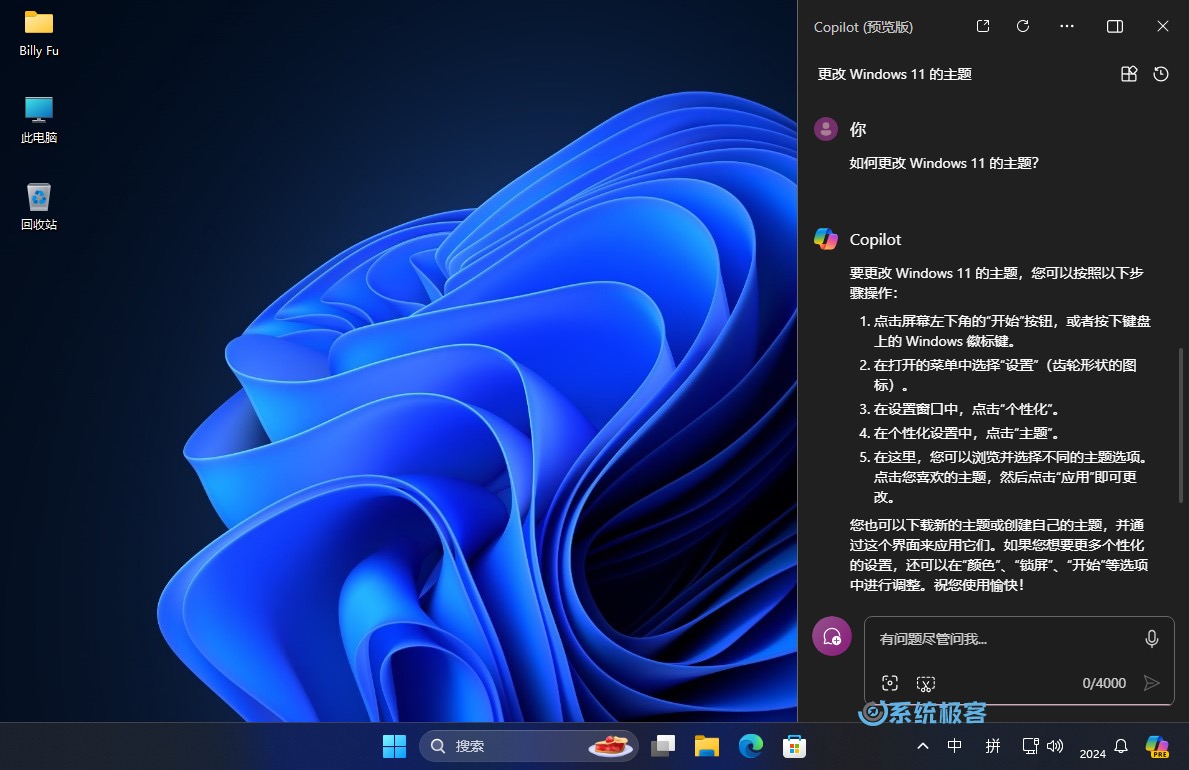 Ask a question to Windows Copilot
Ask a question to Windows Copilot
This article introduces 7 common ways to get help in Windows 11, including using the "Getting Started" app, "Tips" app, "Get Help" app, "Quick Assistant" remote assistance, "Troubleshooting" tools, and F1 shortcut key. Additionally, we provide a brief introduction to using Windows Copilot.
Hope these methods can help you find solutions quickly when you encounter problems.
The above is the detailed content of How to get help in Windows 11. For more information, please follow other related articles on the PHP Chinese website!

Hot AI Tools

Undresser.AI Undress
AI-powered app for creating realistic nude photos

AI Clothes Remover
Online AI tool for removing clothes from photos.

Undress AI Tool
Undress images for free

Clothoff.io
AI clothes remover

Video Face Swap
Swap faces in any video effortlessly with our completely free AI face swap tool!

Hot Article

Hot Tools

Notepad++7.3.1
Easy-to-use and free code editor

SublimeText3 Chinese version
Chinese version, very easy to use

Zend Studio 13.0.1
Powerful PHP integrated development environment

Dreamweaver CS6
Visual web development tools

SublimeText3 Mac version
God-level code editing software (SublimeText3)

Hot Topics
 1393
1393
 52
52
 37
37
 110
110
 Can I install mysql on Windows 7
Apr 08, 2025 pm 03:21 PM
Can I install mysql on Windows 7
Apr 08, 2025 pm 03:21 PM
Yes, MySQL can be installed on Windows 7, and although Microsoft has stopped supporting Windows 7, MySQL is still compatible with it. However, the following points should be noted during the installation process: Download the MySQL installer for Windows. Select the appropriate version of MySQL (community or enterprise). Select the appropriate installation directory and character set during the installation process. Set the root user password and keep it properly. Connect to the database for testing. Note the compatibility and security issues on Windows 7, and it is recommended to upgrade to a supported operating system.
 How to speed up the loading speed of PS?
Apr 06, 2025 pm 06:27 PM
How to speed up the loading speed of PS?
Apr 06, 2025 pm 06:27 PM
Solving the problem of slow Photoshop startup requires a multi-pronged approach, including: upgrading hardware (memory, solid-state drive, CPU); uninstalling outdated or incompatible plug-ins; cleaning up system garbage and excessive background programs regularly; closing irrelevant programs with caution; avoiding opening a large number of files during startup.
 How to solve mysql cannot connect to local host
Apr 08, 2025 pm 02:24 PM
How to solve mysql cannot connect to local host
Apr 08, 2025 pm 02:24 PM
The MySQL connection may be due to the following reasons: MySQL service is not started, the firewall intercepts the connection, the port number is incorrect, the user name or password is incorrect, the listening address in my.cnf is improperly configured, etc. The troubleshooting steps include: 1. Check whether the MySQL service is running; 2. Adjust the firewall settings to allow MySQL to listen to port 3306; 3. Confirm that the port number is consistent with the actual port number; 4. Check whether the user name and password are correct; 5. Make sure the bind-address settings in my.cnf are correct.
 Solutions to the errors reported by MySQL on a specific system version
Apr 08, 2025 am 11:54 AM
Solutions to the errors reported by MySQL on a specific system version
Apr 08, 2025 am 11:54 AM
The solution to MySQL installation error is: 1. Carefully check the system environment to ensure that the MySQL dependency library requirements are met. Different operating systems and version requirements are different; 2. Carefully read the error message and take corresponding measures according to prompts (such as missing library files or insufficient permissions), such as installing dependencies or using sudo commands; 3. If necessary, try to install the source code and carefully check the compilation log, but this requires a certain amount of Linux knowledge and experience. The key to ultimately solving the problem is to carefully check the system environment and error information, and refer to the official documents.
 How to pull the vertical reference line of PS
Apr 06, 2025 pm 08:18 PM
How to pull the vertical reference line of PS
Apr 06, 2025 pm 08:18 PM
Pull vertical guides in Photoshop: Enable ruler view (View > ruler). Hover the mouse over the vertical edge of the ruler, and then the cursor becomes a vertical line with double arrows and hold and drag the mouse to pull out the reference line. Click Delete by dragging the guide, or hovering it into a cross.
 MySQL can't be installed after downloading
Apr 08, 2025 am 11:24 AM
MySQL can't be installed after downloading
Apr 08, 2025 am 11:24 AM
The main reasons for MySQL installation failure are: 1. Permission issues, you need to run as an administrator or use the sudo command; 2. Dependencies are missing, and you need to install relevant development packages; 3. Port conflicts, you need to close the program that occupies port 3306 or modify the configuration file; 4. The installation package is corrupt, you need to download and verify the integrity; 5. The environment variable is incorrectly configured, and the environment variables must be correctly configured according to the operating system. Solve these problems and carefully check each step to successfully install MySQL.
 Unable to access mysql from terminal
Apr 08, 2025 pm 04:57 PM
Unable to access mysql from terminal
Apr 08, 2025 pm 04:57 PM
Unable to access MySQL from the terminal may be due to: MySQL service not running; connection command error; insufficient permissions; firewall blocks connection; MySQL configuration file error.
 How to copy and paste mysql
Apr 08, 2025 pm 07:18 PM
How to copy and paste mysql
Apr 08, 2025 pm 07:18 PM
Copy and paste in MySQL includes the following steps: select the data, copy with Ctrl C (Windows) or Cmd C (Mac); right-click at the target location, select Paste or use Ctrl V (Windows) or Cmd V (Mac); the copied data is inserted into the target location, or replace existing data (depending on whether the data already exists at the target location).




